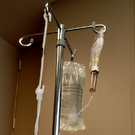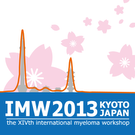Articles tagged with: Meeting Update
News»

A sub-analysis of recent Phase 2 clinical trial results indicates that Pomalyst in combination with low-dose dexamethasone is effective and safe in multiple myeloma patients with high-risk chromosomal abnormalities who did not respond to prior therapy.
The findings were presented by Dr. Paul Richardson of the Dana-Farber Cancer Institute in Boston at the International Myeloma Workshop (IMW) in Kyoto, Japan, this past Sunday.
In the new analysis, high-risk patients were defined as those with a deletion in chromosome 17 (del17p) or the translocation t(4;14).
Although the response rates were lower and survival times shorter …
News»

Initial results of an ongoing Phase 2 clinical trial show that Kyprolis in combination with Revlimid and low-dose dexamethasone may be effective and safe in high-risk smoldering multiple myeloma patients.
Specifically, the results show that all patients responded to the combination therapy, with 75 percent of patients achieving at least a near complete response.
Progression-free or overall survival results are not yet available, though, to indicate whether the combination therapy delays progression to myeloma or extends overall survival.
Dr. Ola Landgren from the U.S. National Cancer Institute and National Institutes of Health …
News»

Multiple myeloma specialists have begun to gather at the 14th International Myeloma Workshop to review the latest findings in the field of multiple myeloma. The meeting started in Kyoto, Japan, earlier today and will run through Sunday, April 7.
The International Myeloma Workshop (IMW) is a scientific meeting that focuses solely on myeloma-related research findings. It takes place every two years at locations around the world.
The research presented at the meeting will cover all areas of multiple myeloma, including the biology, diagnosis, treatment, and progression of the disease.
The Myeloma Beacon …
News»

Results of a Canadian retrospective analysis indicate that multiple myeloma patients who develop one or more new monoclonal proteins (M-spikes) after stem cell transplantation may have improved progression-free and overall survival compared to those without a new M-spike.
Myeloma cells overproduce a single type of antibody, known as a monoclonal or M-protein. Different types of myeloma are classified according to the type of M-protein the patient’s myeloma cells produce.
When a patient’s original M-spike disappears and an M-spike of a different monoclonal protein appears, this is known as monoclonal banding. When the …
News»

Results from a recent retrospective study demonstrate that the risk of infection is significantly higher in multiple myeloma patients compared to the general population.
Furthermore, the study investigators found that the rate of infection in myeloma patients has increased in recent years.
“Our study raises the question whether modern myeloma therapy increases the risk of infections,” said Dr. Cecilie Blimark from the Sahlgrenska University Hospital in Gothenburg, Sweden, who presented the study findings at the American Society of Hematology (ASH) annual meeting last month.
“The increasing risk [of developing an infection] in …
News»

Daratumumab continues to show promise for relapsed and refractory multiple myeloma patients. Results from a Phase 1/2 study indicate that daratumumab may be effective and safe in heavily pretreated patients.
In particular, daratumumab's activity as an anti-myeloma agent seems at least as good as that of the newest myeloma therapies.
“The response to daratumumab was accompanied by the clearance of myeloma cells,” said Dr. Torben Plesner from the Vejle Hospital in Denmark, who presented the findings from the daratumumab trial at the 2012 American Society of Hematology (ASH) meeting last month.
“Daratumumab …
News»

Results from an ongoing Phase 1 study demonstrate that lorvotuzumab mertansine in combination with Revlimid and dexamethasone is effective as a therapy for relapsed and refractory myeloma patients.
The updated trial results were presented by Dr. Jesus Berdeja from the Sarah Cannon Research Institute in Nashville, Tennessee, the American Society of Hematology (ASH) annual meeting in Atlanta last month.
Ten patients are currently continuing with the clinical trial. According to Dr. Berdeja, these interim results support the continued evaluation of the combination in relapsed and refractory myeloma patients. "This was a fairly …

